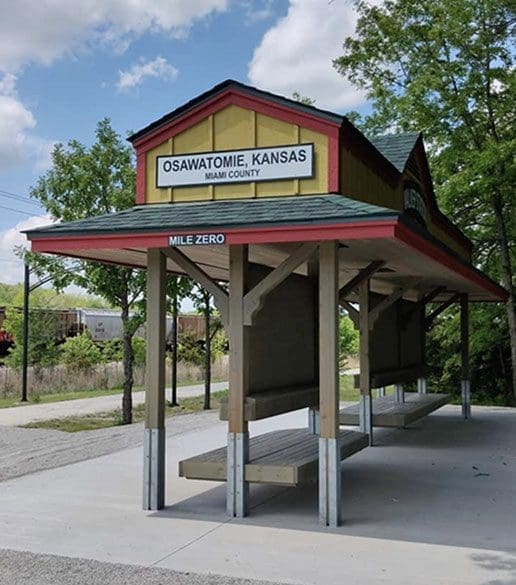Manhattan, Kan. — Mike Scanlon believes – truly believes – in the power of trails for driving economic development. Trails, he says, for biking, walking, running…
Scanlon is the city manager in Osawatomie, Kan., which sits at Mile Zero of the 118-mile Flint Hills Trail in eastern Kansas. The community’s location provides a unique opportunity to introduce people to the charming town of just under 5,000 residents.
“We are on the eighth longest trail in the United States,” Scanlon said. “Our goal is to turn it into a tourist destination for Osawatomie and increase our pull factor,” a measure of how much business is leaving the community compared to how much is coming in.
Scanlon was among several local officials in Kansas who spoke about economic opportunities associated with recreational trails during the recent monthly online series, First Friday e-Call, which helps to nurture small businesses and inspire entrepreneurship in Kansas.
The Sunflower Foundation, a statewide health philanthropy, reports that in the past 16 years, it has supported more than 210 trail projects in 80 counties.
“We have learned so much over that time,” said Elizabeth Burger, a senior program officer with the Sunflower Foundation. “In the beginning, we thought, ‘oh, trails…that would be good if we want to get people outside for physical activity.’”
But research proves it goes well beyond physical health. Burger said public recreational trails also lead to positive effects on mental health, as well as building community pride, quality of life and social cohesion.
“A fifth benefit,” she said, “is the economic potential. Trails attract visitors, (as well as) residents in your own community.”
Trails are only one part, but the independent non-profit research group Headwater Economics reports that outdoor recreation contributes $459.8 billion to the United States’ Gross Domestic Product – about three times the contribution of the country’s airline industry. The group reports that communities with outdoor recreation-based economies attract entrepreneurs and new residents, including retirees and people with investment income.
Lelan Dains is the Director of Visit Emporia and co-founder of Unbound Gravel, a bike racing series growing in popularity across the United States that capitalizes on gravel roads in scenic areas to draw its participants.
“Kansas is every bit the cycling destination that we believe it to be, and that we have built it to become,” Dains said. This year’s Unbound Gravel race in Lyon County – held in July — drew approximately 4,000 riders from across the world.
“Kansas is just beautiful and the whole state is filled with imagery such as (is seen during Unbound Gravel),” Dains said.
More information regarding future funding opportunities from Sunflower Trails is available by contacting Burger by email, eburger@sunflowerfoundation.org.
K-State’s First Friday e-call also included a presentation by Sunflower Foundation student intern Gabi Talavera who talked about recruiting volunteers – especially younger people – for trail projects.
The full presentation, and a full listing of previous First Friday topics, are available online from K-State Research and Extension.













